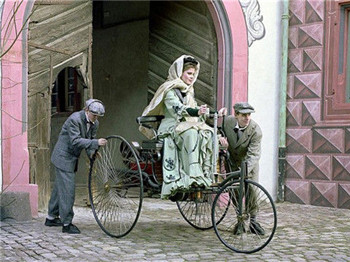For most people, gadgets like smart phones and wearables are nothing more than the magical little machines that make it easier to do things like Facebook-stalk an ex in that Monday morning meeting. However, they probably don’t know who invented the first smart watch or the person who paved the way for “smart refrigerators” that can tell you when you’re out of milk。
对于大多数人来说,像智能手机和便携式计算机这样的小玩意只是一些神奇的小电器,它们能为人们提供便利,比如让你在周一的会议上用脸书网人肉搜索前任的踪迹。可是,人们大概并不知道是谁发明了第一款电子手表,也不知道谁为能告诉你什么时候没牛奶了的“智能冰箱”发明铺平了路。
Many of the world’s biggest inventions that have made life possible and transformed entire industries came from the minds of overlooked and underrated geniuses. Meet the men and women who’ve shaped our reliance on and expectations for technology, but aren’t as widely known as they should be。
世界上有许多最伟大的发明,它们为我们实现了新的生活方式,革新了整个工业系统,而它们却都是源于一些被众人忽略,怀才不遇的天才头脑。了解一下这些天才吧,是他们促生了我们对科技的依赖和期望,他们本应名声斐然,却鲜为人知。

1.Bertha Benz, Mother of Motoring (1849-1944)
贝尔塔-本茨 汽车之母
Bertha Benz was the trailblazing wife of the German engineer, Karl Benz, credited today with inventing the first modern car. Karl was apparently a genius engineer, but he didn’t have the same business acumen or vision as his wife (he didn’t even think to fit the vehicle with a fuel tank)。
贝尔塔-本茨是德国机械师卡尔·本茨的妻子,她是名具有开拓精神的女子,她为第一辆现代汽车的发明做了不小的贡献。她的丈夫卡尔确实是个天才的机械师,但他却不如妻子那样具有商业头脑和远见(他甚至没想到在汽车上装上油箱。)
2. Florence Parpart, Creator of The Modern Refrigerator (Early 20th Century)
佛罗伦萨-帕帕特,现代冰箱的发明者
In 1914, Florence Parpart - a housewife from New Jersey - won a patent for the first modern refrigerator that used electricity, rendering the icebox obsolete. It is believed that she may have used her fiancé’s expertise in electrical circuitry to assist with the first prototype。
在1914年,佛罗伦萨-帕帕特——一位来自美国新泽西的家庭妇女——为自己的发明获得了一项专利,她发明了第一台电力驱使的现代冰箱,淘汰了冷藏库。人们相信她在研制第一代冰箱原型的时候一定借助了她的未婚夫在电路上的专业优势。
3. Marie Van Brittan Brown, Home Security Siren (1922-1999)
玛丽-范-布里坦-布朗,家用安保系统
As a nurse who worked odd hours, she was concerned about the recent uptick in crime and wanted to easily identify visitors at the door。
作为一名上班时间不固定的护士,玛丽对当时犯罪率的不断上升感到忧虑,她希望能够在家门口就能辨别来访的人是否安全。
She and husband Albert Brown, an electronics technician, devised a mechanism featuring four peep holes and a motorized camera, which could slide up and down to look out each one. The surveillance device also gave a homeowner the ability to unlock the door with a remote control, or press a button to alert a nearby neighbor or security firm。
她和作为电子机械师的丈夫艾伯特·布朗发明了一种机械,这种机械备有四个监控口,还有一个可活动的摄像头,摄像头可以上下移动,观测四个监控口中的情况。这种监控设备还能让家中主人遥控开门,或者触动按钮向周围邻居或安全公司发出警示。
Patented in 1969, the Browns’ invention is now the framework for modern home security, crime prevention, and traffic monitoring。
设备在1969年获得了专利,布朗的这项发明成为了现代家庭安保设备,社会预防犯罪设施,交通监控设施得以发展的基本架构。
4. Edward Thorp, Father of Wearable Computing
爱德华-索普,可穿戴式电脑之父
MIT mathematics professor and hedge fund manager Edward Thorp loved beating the odds so much that in 1961 he invented the world’s first wearable computer to help him win at casinos。
麻省理工大学的数学教授和对冲基金经理——爱德华-索普喜欢战胜困难,就此在1961年,他发明了世界上第一台可穿戴式电脑,帮助他在赌场里赢钱。
Thorp and his co-conspirator, professor Claude Shannon, who had worked on cryptography and code-breaking during World War II, created what is widely regarded as the first wearable computer。
索普和自己的合作者——在二战时期致力于密码编写和破译的相关研究的克劳德-香农共同发明了被公认为世界上第一台的可穿戴式电脑。












